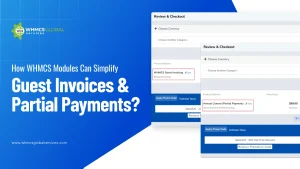
Web hosting businesses rely on efficient billing and client management systems to streamline operations and provide a seamless experience to their customers. In this fast-paced digital era, choosing the right platform for managing web hosting services is crucial for success. Two popular options in the market are WHMCS and Blesta, each offering its own set of features and advantages. In this blog, we will delve into a detailed comparison of WHMCS and Blesta to help you determine which one is better suited for your specific needs.
Now, let’s dive deeper into the comparison of key features, pros and cons, customer support options, and real-world experiences to help you make an informed decision about whether WHMCS or Blesta is the better choice for your web hosting business.
WHMCS vs BLESTA Comparison Chart
| Features | WHMCS | BLESTA |
| Billing Portal | YES | YES |
| Customizable Invoices | YES | YES |
| Project Billing | YES | NO |
| Billing & Invoicing | YES | NO |
| Free Trial | NO | YES |
| Pricing | $18.95 /month | $12.95 /month |
WHMCS VS Blesta: Which one to select?
To give you a clear picture, let’s understand the features, pros, and cons of WHMCS Vs Blesta.
What is WHMCS?
WHMCS (Web Hosting Manager complete solution) is a significant billing and client management platform designed for web hosting organizations. Also, WHMCS serves as an all-in-one solution that automates various aspects of web hosting business operations, including invoicing, billing, customer support, domain registration, and more.
WHMCS has been one of the leading names when it comes to web hosting management software for some time. WHMCS has one of the best features that you have expected in customer, billing, and domain management. This enables you to handle other tasks like providing technical support for your clients.
Key Features:
- Web Hosting Automation
- Set up multiple hosting tiers and products
- Support Ticket System
- Integration with Control Panels
- Reporting and Statistics
- Customized Dashboard
Related Article:
Pros and Cons of WHMCS
Pros:
1. WHMCS provides seamless integration with popular control panels like cPanel and Plesk, which makes it easy to manage and organize hosting accounts. It also supports integration with numerous payment gateways, enabling businesses to automate payment processing.
2. WHMCS provides a customizable interface, enabling businesses to brand the software to match their own identity. It also supports the development of custom modules and plugins, allowing for further customization and integration with other systems.
3. WHMCS automates many routine tasks such as invoicing, provisioning, and account management. This automation saves time and reduces human error, increasing overall efficiency and productivity.
Cons:
1. Most users think it’s expensive compared to Blesta, But the pricing is worth it as it provides top-notch quality with a robust feature set.
What is Blesta?
Blesta is a popular web-based client management and billing software created specifically for web hosting developers, providers, and other online services businesses. It is utilized to automate and streamline various aspects of business operations, including billing, invoicing, support ticket management, and customer management.
Speaking about the features, Blesta includes all the basics like invoice delivery, account management, and payment processing. Blesta provides custom services that enable businesses to manage their customers, products, and services efficiently. It offers a centralized platform for managing billing cycles, generating and sending invoices, tracking payments and handling recurring billing.
Key Features:
- Client management
- Support ticket management
- Developer friendly
- Multiple Billing methods
Related Article:
Pros and Cons of Blesta
Pros:
1. Blesta offers an intuitive and user-friendly interface, making it easy for businesses to navigate and utilize its features effectively.
2. Invoicing, payment tracking, and recurring billing are just a few of the billing procedures that Blesta is excellent at automating. Through automation, administrative processes are streamlined, time is saved, and the possibility of billing management errors is reduced.
3. With Blesta, businesses can customize the software’s appearance, layout, and branding to align with their own identity.
Cons:
1. While Blesta offers several integration options, its ecosystem of third-party extensions and plugins may be more limited compared to other billing platforms. This could potentially limit some businesses’ ability to integrate with specific tools or services they rely on.
2. Blesta provides support resources such as documentation, a knowledge base, and a community forum, some users have reported challenges in obtaining prompt and comprehensive support for complex issues.
What can you expect from these?
Customer Experience:
Using WHMCS, you can easily control everything from the control panel, including selling domains, registering/transferring/renewing domains, and hosting plans. It gives you easy access to information related to all orders, clients, products, and services. Along with essential utilities, it also offers add-on services, including apps and integration.
Reporting:
WHMCS generates a detailed analytic report which includes Daily Performance, Income Forecast, Annual Income Report, New Customers, Tickets, Feedback Scores, and Batch Invoice PDF.
Even more, it is easy to manage and escalate the tickets submitted by customers in the control panel. When your customer submits a new ticket, immediately, you get a notification through email.
Blesta’s report is not detailed as compared to WHMCS. Its default reports include aging invoices, client data portability, custom report, invoice creation, tax liability, transactions applied, transactions received, and package revenue.
Pricing:
WHMCS offers two monthly plans – a Starter plan and a Plus plan. A starter plan costs $15.95/month, and a Plus plan costs $18.95. Both plans can support up to 250 clients.
So WHMCS is more expensive? But remember, all precious and quality things are costly, and all the plans of WHMCS come with a 30-day money-back guarantee. So, you can easily avail yourself of a 30-day money-back guarantee and quickly try WHMCS. Moreover, it is observed that many users prefer WHMCS over Blesta as its modules need to be revised for their needs.
Customization:
You can go for it Whenever you need to modify, customize, or integrate your WHMCS with other systems. Third-party developers are welcome to customize the client-facing UI, Customise text & phrases, Integrate & Extend functionality and APIs for Authenticating WHMCS, Hook into events as they occur, and Interact with WHMCS remotely. They also have documentation on their official website for developers working with WHMCS.
Blesta is designed to be more developer friendly than WHMCS. So, it offers many customizable options for customer billing. The source code of Blesta is available for editing natively.
Marketing / Business:
Blesta is the best option if you have a low budget and are looking for only a few modules. And it offers plenty of billing options. On the other hand, WHMCS provides an affiliate system that helps you promote your hosting services. So, eventually, you could bring a lot more business over the long term.
WHMCS vs BLESTA: Final Verdict
When comparing, it’s vital to consider your business’s specific requirements and priorities. WHMCS has advantages that make it a popular choice among web hosting providers. At the same time, both platforms offer similar functionalities. But It’s worth noting that the final verdict ultimately depends on your specific needs and preferences. Therefore, consider evaluating both platforms based on your requirements, budget, and the customization and integration you desire to start your reseller web hosting business.
Related Article:



